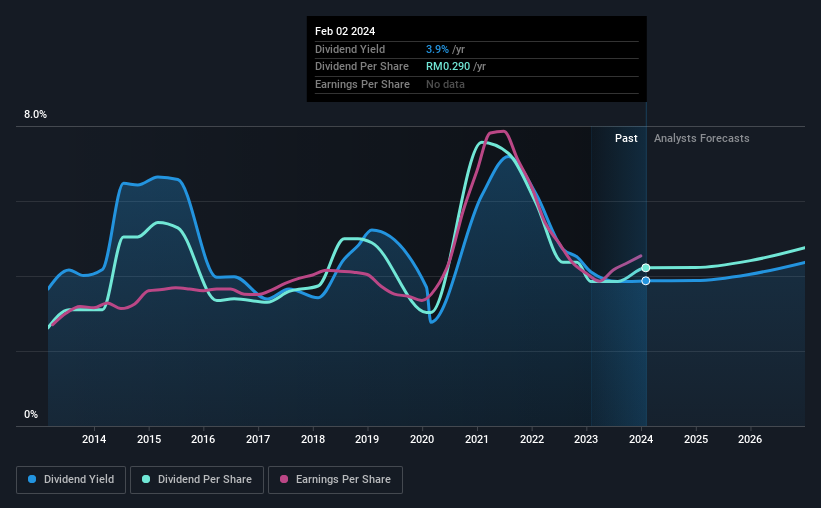- Malaysia
- /
- Capital Markets
- /
- KLSE:BURSA
Bursa Malaysia Berhad (KLSE:BURSA) Is Due To Pay A Dividend Of MYR0.14
Bursa Malaysia Berhad's (KLSE:BURSA) investors are due to receive a payment of MYR0.14 per share on 29th of February. The payment will take the dividend yield to 3.9%, which is in line with the average for the industry.
Check out our latest analysis for Bursa Malaysia Berhad
Bursa Malaysia Berhad's Dividend Is Well Covered By Earnings
We like to see a healthy dividend yield, but that is only helpful to us if the payment can continue. Before making this announcement, Bursa Malaysia Berhad was paying out quite a large proportion of both earnings and cash flow, with the dividend being 136% of cash flows. Paying out such a high proportion of cash flows can expose the business to needing to cut the dividend if the business runs into some challenges.
Over the next year, EPS is forecast to expand by 12.3%. Assuming the dividend continues along recent trends, our estimates say the payout ratio could reach 87% - on the higher side, but we wouldn't necessarily say this is unsustainable.

Dividend Volatility
Although the company has a long dividend history, it has been cut at least once in the last 10 years. Since 2014, the dividend has gone from MYR0.18 total annually to MYR0.29. This means that it has been growing its distributions at 4.9% per annum over that time. The dividend has seen some fluctuations in the past, so even though the dividend was raised this year, we should remember that it has been cut in the past.
The Dividend's Growth Prospects Are Limited
With a relatively unstable dividend, it's even more important to evaluate if earnings per share is growing, which could point to a growing dividend in the future. However, Bursa Malaysia Berhad has only grown its earnings per share at 2.3% per annum over the past five years. There are exceptions, but limited earnings growth and a high payout ratio can signal that a company has reached maturity. When the rate of return on reinvestment opportunities falls below a certain minimum level, companies often elect to pay a larger dividend instead. This is why many mature companies often have larger dividend yields.
The Dividend Could Prove To Be Unreliable
In summary, while it's always good to see the dividend being raised, we don't think Bursa Malaysia Berhad's payments are rock solid. The payments are bit high to be considered sustainable, and the track record isn't the best. We don't think Bursa Malaysia Berhad is a great stock to add to your portfolio if income is your focus.
Companies possessing a stable dividend policy will likely enjoy greater investor interest than those suffering from a more inconsistent approach. However, there are other things to consider for investors when analysing stock performance. For example, we've picked out 2 warning signs for Bursa Malaysia Berhad that investors should know about before committing capital to this stock. Is Bursa Malaysia Berhad not quite the opportunity you were looking for? Why not check out our selection of top dividend stocks.
Valuation is complex, but we're here to simplify it.
Discover if Bursa Malaysia Berhad might be undervalued or overvalued with our detailed analysis, featuring fair value estimates, potential risks, dividends, insider trades, and its financial condition.
Access Free AnalysisHave feedback on this article? Concerned about the content? Get in touch with us directly. Alternatively, email editorial-team (at) simplywallst.com.
This article by Simply Wall St is general in nature. We provide commentary based on historical data and analyst forecasts only using an unbiased methodology and our articles are not intended to be financial advice. It does not constitute a recommendation to buy or sell any stock, and does not take account of your objectives, or your financial situation. We aim to bring you long-term focused analysis driven by fundamental data. Note that our analysis may not factor in the latest price-sensitive company announcements or qualitative material. Simply Wall St has no position in any stocks mentioned.
About KLSE:BURSA
Bursa Malaysia Berhad
An exchange holding company, provides treasury management, and management and administrative services.
Flawless balance sheet with questionable track record.
Similar Companies
Market Insights
Community Narratives




